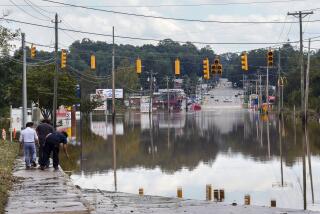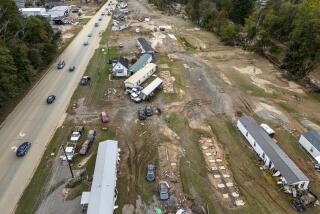Bush Vows He ‘Won’t Be Out-Worked, Out-Hustled’ in Swing Through South
- Share via
COLUMBIA, S. C. — When the going is good, the wind at your back, the office of vice president can provide an overpowering footing for waging a campaign for the presidency.
On a three-day swing through the Deep South, one of his presumed electoral strongholds and a crucial battleground, Republican George Bush showed off the authority and dazzling resources of his office.
In Tupelo, Miss., school was interrupted Friday so that the town’s children, nearly 2,000 strong, could gather and put on an ear-deadening political rally in a high school gymnasium.
Local television carried the event live throughout the morning, even charting the progress of the vice president’s limousine as it approached the site.
In Florence, S. C., school buses bearing a band and choir joined a sizable portion of the community’s population at an outdoor plantation buffet, known as a “chicken bog.” Race car celebrity Cale Yarborough pitched horseshoes with Bush in the picturesque red glow of a Southern sunset. Bush addressed the crowd from an antebellum porch while an army of police added to the atmosphere of the moment.
Again, local television broadcast live from the scene.
In Columbia, on Saturday, Bush, a glass of Bud Light in hand, delighted supporters with a free-beer tailgate party at the football game between the University of South Carolina and North Carolina State. Then he got himself introduced to 60,000 in the grandstand, whisking in and out of the stadium while traffic was held back.
Throughout South Carolina, police officers stood at attention as the vice president’s dozen-car motorcade thundered through towns. People got out of their cars to applaud, never mind the inconvenience. Local newspapers played Bush’s arrival as Page 1 news.
Voters Ride in Motorcade
Prominent uncommitted voters were invited to ride in the flashing-light motorcade and given private background briefings.
“People here really appreciate the attention,” explained John Wells, a Bush organizer from Elgin.
Unburdened by weighty Washington responsibilities but still commanding government logistic support second only to the President’s, Bush is going places where no sitting vice president has ever gone and promising, “I won’t be out-worked, out-hustled.”
Campaign director Lee Atwater said lavish devotion of time to a state like South Carolina, Atwater’s own home, produces immediate results. “Six stops in two days like we’re doing and you can move a state like South Carolina,” Atwater explained for the trip that ended Saturday.
Rivals concede the point.
“If I have one criticism of my man’s campaign, (it) is that he doesn’t spend enough time here--I don’t think he is taking it seriously,” shrugged Bill Tallon, a retiree in Florence, who is co-chairman of the local campaign for rival presidential candidate Bob Dole, Senate minority leader. Tallon was interviewed as he enjoyed his Friday at a George Bush event.
Targeting South Carolina derives from the timing of its GOP primary--on Saturday, March 5, 1988. That is three days before the Super Tuesday primaries in the rest of the South.
“This will be the weather vane, the bellwether,” Bush said.
He is banking on a strong showing in the South, starting in South Carolina, to bounce him back into contention should he show poorly in opening Iowa and New Hampshire voting, or to sew up the nomination if he crushes his opponents in the early going.
Clearly, part of the reason for the upbeat mood on the vice president’s high-powered Southern swing last week was his debate debut in Houston on Wednesday night. His parry of attacks and steady presentation of views was widely viewed as an unexpectedly strong performance.
This mood was easily enhanced on the campaign stump by the peerless logistical capabilities of the White House. As vice president, Bush travels on a variety of military aircraft at his disposal, accompanied by a contingent of Secret Service bodyguards, a White House communications team, a Navy doctor and police escorts to clear the highways at every stop. No other candidate could hope to touch it--or afford it. While the Bush campaign picks up the tab for political aides and advance workers, much of the cost of the vice president’s entourage is paid for by taxpayers.
But vice presidential incumbency is a sword, as they say, with two sharp edges.
“My theory of the incumbency is like the theory of judo--your weight can work for you or your weight can work against you,” Atwater said.
That means, if nothing else, mistakes are more visible, less excusable and long remembered.
Bush frequently notes that no incumbent vice president has won the presidency since Martin Van Buren in 1836.
But then, he adds, hopefully, “only two have tried.” And, he notes, both came close--Richard M. Nixon in 1960 and Hubert H. Humphrey in 1968.
Still, Bush is often reminded how a vice presidential gaffe tends to be larger and more lasting than one by a congressman or governor, magnified by the very White House trappings and air of acumen that can work to his advantage.
In the midst of his South Carolina barnstorming, for instance, Bush was asked about the Savannah River Plant, a nuclear facility where safety is a growing issue.
Bush gave a long and standard answer about how nuclear power is important to meet U.S. energy demands.
After several minutes, he was informed that the Savannah River Plant, oops, does not produce energy, but plutonium and other materials for nuclear weapons.
Just as the vice president’s arrival in town made newspaper headlines, so did his faux pas. He was forced to study up and issue a statement a day later indicating that he was now familiar with the controversy over the plant and felt its continued operation was an “absolute essentiality.”
More to Read
Get the L.A. Times Politics newsletter
Deeply reported insights into legislation, politics and policy from Sacramento, Washington and beyond. In your inbox twice per week.
You may occasionally receive promotional content from the Los Angeles Times.










